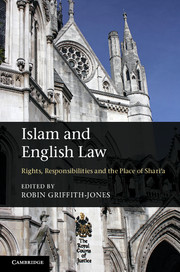Book contents
- Frontmatter
- Contents
- List of contributors
- List of abbreviations
- Preface
- Introduction
- Part I The Archbishop of Canterbury and shariʽa law
- Part II The Archbishop’s proposal for ‘transformative accommodation’
- Part III Responsibilities and rights
- Freedom of speech, incitement to religious hatred: beyond the divide?
- 13 Where to draw the line, and how to draw it
- 14 Censor or censure: maintaining civility
- 15 In praise of ‘fuzzy law’
- Religion, the state and the meaning of ‘jihad’
- Part IV Prospect: equality before God and before the law
- Select bibliography
- Index of cases
- Index
15 - In praise of ‘fuzzy law’
Published online by Cambridge University Press: 05 April 2013
- Frontmatter
- Contents
- List of contributors
- List of abbreviations
- Preface
- Introduction
- Part I The Archbishop of Canterbury and shariʽa law
- Part II The Archbishop’s proposal for ‘transformative accommodation’
- Part III Responsibilities and rights
- Freedom of speech, incitement to religious hatred: beyond the divide?
- 13 Where to draw the line, and how to draw it
- 14 Censor or censure: maintaining civility
- 15 In praise of ‘fuzzy law’
- Religion, the state and the meaning of ‘jihad’
- Part IV Prospect: equality before God and before the law
- Select bibliography
- Index of cases
- Index
Summary
My term as a judge has come to its end. I have been able to reflect on what I was doing for fourteen years. How did I arrive at decisions? The judgments, as read, appear to proceed very logically: I say what this case is about, I set out the facts, state the legal principles that apply, and apply them to the facts to get a particular result. But all that is retrospective. Usually the very last sentence I would write was: ‘This case raises questions about …’. Only after I had been through all the turmoil, the wriggling, the going backwards and forwards, the wrestling with the material, did I get a sense of what the core issue was. In this chapter too I start off with the approach I would normally take to a legal issue presented to me as a judge. But whereas in writing a judgment I had ultimately to rationalise it all and come to a final determination, in a chapter such as this I can throw out certain ideas and propositions, and leave the conclusion open.
I begin with the instincts that I think any judge has when first coming across a case. These are not simply personal predilections. They are instincts based on decades of experience in a particular area, both conscious and to some extent unconscious. They have been shaped by a life spent in law, in litigation, in thinking about law, in seeing how law evolves and how one’s own thought has evolved. I start here with what appears to be a contradiction. The idea of banning and prohibiting The Satanic Verses in the United Kingdom, I find horrific. The idea of permitting the publication of the Danish cartoons in England, I find horrific. What separates the two? What values are involved? Then I proceed from thinking about these concrete situations to determine why my instincts push me in one direction or another.
- Type
- Chapter
- Information
- Islam and English LawRights, Responsibilities and the Place of Shari'a, pp. 225 - 236Publisher: Cambridge University PressPrint publication year: 2013



